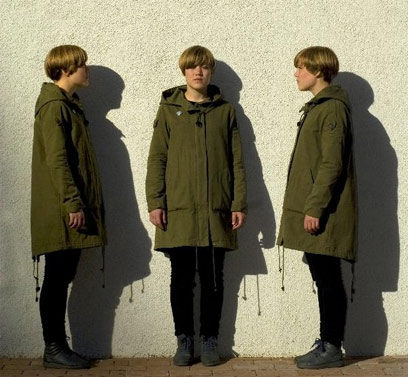

Chris Mosey is a journalist and researcher with close connections to the Celsius Center for Scandinavian Studies. This article was published in THE OBSERVER, August 19, 1984.
The removal of a four year-old girl from her parents has focused attention on the power of intrusion into family life that Sweden grants civil servants.
Social workers seized Victoria Busse, daughter of West German musician Timm Busse and his Israeli wife Ester, two months ago.
She was reunited last Wednesday with her parents after an investigation by The Observer. But social welfare authorities will apply on Tuesday for a new order to take Victoria back into care.
"It is now a matter of prestige for them," said Magnus Sjolin, Timm Busse's lawyer. "My client is being persecuted simply because he is fighting the system."
Busse said: "Now we have got Victoria back, we will not flee the country as many people have advised. We will stay and fight!" He is demanding an apology from the Swedish authorities and has reported the social workers concerned to Sweden's Justice Ombudsman.
For their part, the social workers will contest on Tuesday a court decision rescinding their right to take Victoria into care.
Busse, 25, says Victoria was taken from him purely on hearsay evidence that she was beaten. This was given to the authorities in anonymous telephone calls from his Swedish neighbours, with whom he had a long-running feud.
He told The Observer that when the case was settled and he had received an apology, the family would leave Sweden for good, possibly for Britain, "where there still remains justice for the individual."
Victoria is one of thousands of children who have been forcibly removed from their parents by the authorities in Sweden, on evidence that would not be acceptable elsewhere in Western Europe.
Figures of children in care are hard to come by but in 1981, 12,378 children were taken from their parents, 1,398 of them forcibly.
The total number of children in care was 24,000. The authorities say that, since then, the law has changed and that in 1982 only 943 children were forcibly taken into care. This remains an astonishing total in a country with a population of only 8,500,000.
Busse says, and is supported by official documentation I have seen on the case, that Victoria was taken into care purely on the evidence given in anonymous phone calls by his neighbours. "I do not get on well with my neighbours," he admitted. "Both my wife and I have artistic temperaments."
He also says that the social workers are bemused by the fact that he and his wife do not want Victoria to go to a day care centre.
Until she was taken into care, Victoria was looked after by her father while her mother worked in a laundry. "It might be a little unconventional but I am studying music, so it suited me to be at home,' said Busse.
Ester Busse, 24, said : "I want to work but I want Victoria to be brought up by us, not by the Swedish state.
After the neighbours complained, two social workers visited the family's three-room flat in Brandbergen, a dormitory town in the Haninge area near Stockholm, and ordered them to take Victoria to hospital for medical examination.
"I panicked," said Busse. "I had read that such a hospital examination was always the first step to them taking your children from you."
The family took a boat from Sweden to Finland, then another boat to Hamburg where German police informed them that an order had been made in Stockholm taking Victoria into care.
Busse sought legal advice then took Victoria for an examination by Professor Helmut Bochncke, a respected children's doctor.
His report concluded: "The child is completely believable, speaks English, and answers without inhibition and freely. There are no signs whatsoever of illness or injury. The child's nature speaks clearly against a disturbed relationship with the parents. The child is open, candid and happy."
Armed with the report, the family returned to Sweden. "I deeply regret it now," said Busse.
On 25 June, social workers Eva Björklund and Inger Wolf accompanied by two plainclothes police officers took Victoria to hospital.
After a week of medical tests, Victoria was sent to Edshöjden children's home, 25 miles from the Busses' home.
The final medical report on Victoria by Dr Gunnar Braathen, described her as "healthy and talkative." It said: "There was no sign of fresh or old fractures ... no sign of maltreatment."
The social workers said Victoria could return home next month if the Busses agreed to abide by a nine-point 'work plan.'
This required the parents to attend a local psychiatric therapy group once a week for at least a year. Victoria should also be enrolled at a day care centre, staying there for a minimum of seven hours, each day. In the interim, Ester Busse, 24, would have to join her daughter in the children's home "to get insight into her role as a parent."
An official investigation has been ordered into allegations by Busse that Victoria was mistreated by one of the staff at the Edshojden children's home. He says he took pictures during one visit showing burn marks and scratches on her body.

